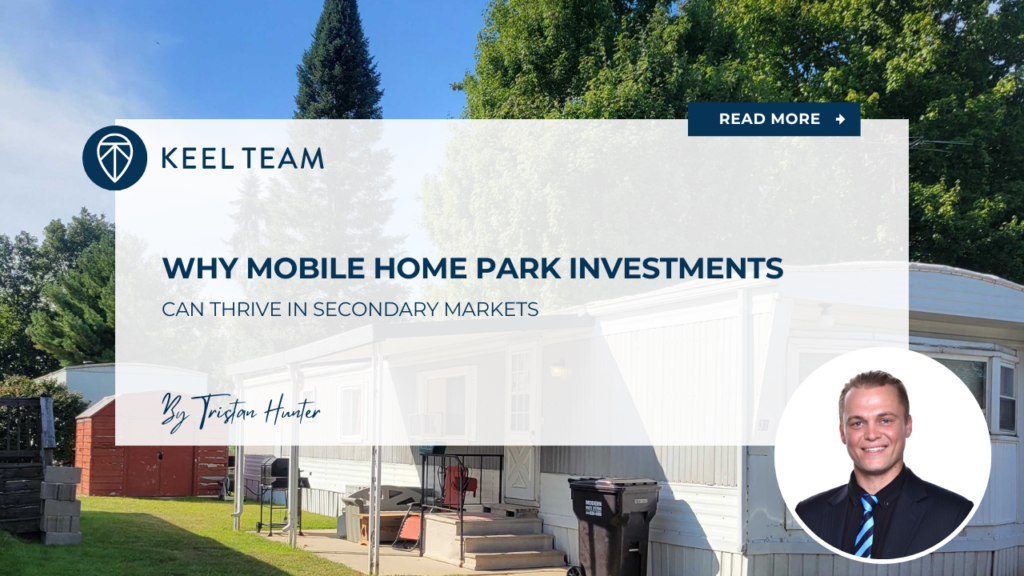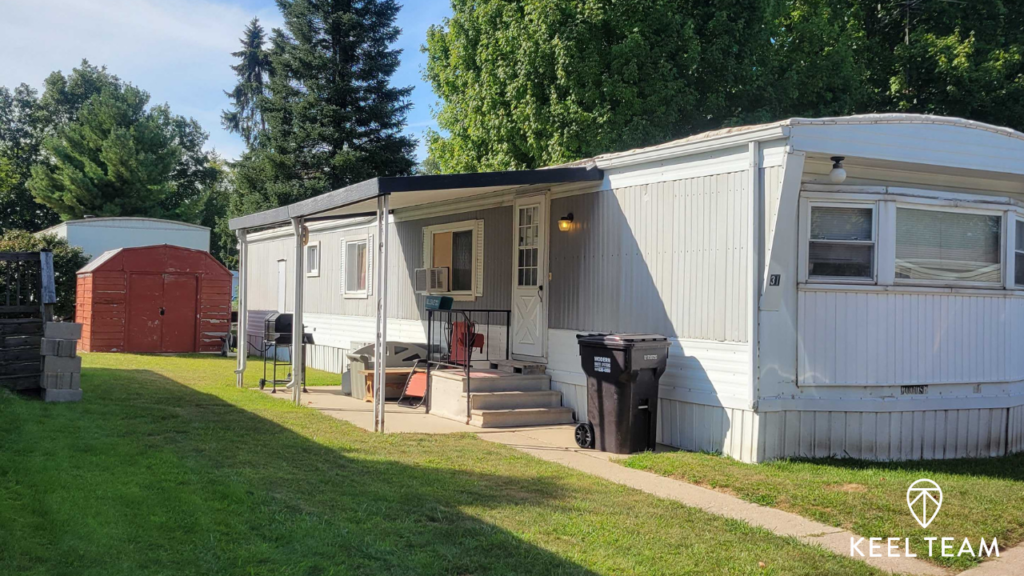Why Mobile Home Parks Can Thrive in Secondary Markets
-
 Tristan Hunter - Investor Relations
Tristan Hunter - Investor Relations

Investing in mobile home parks has gained popularity due to the stability and consistent returns these properties often offer. However, the location of a mobile home park plays a significant role in determining its potential success. While many investors gravitate toward primary markets, secondary markets – smaller cities and towns – tend to offer compelling opportunities for mobile home park investments. This article explores why secondary markets often create favorable mobile home park investment conditions.
What Are Secondary Markets?
Before diving into why mobile home park investments thrive in secondary markets, it’s essential to define what secondary markets are. Secondary markets are typically smaller metropolitan areas or towns with growing populations, but they are not as large or densely populated as primary markets like New York City or Los Angeles.
Examples of secondary markets include cities such as Des Moines, Iowa, or Knoxville, Tennessee. These areas often have lower costs of living, steady economic growth, and less competitive real estate markets, making them attractive for mobile home park investments.
1. Lower Competition for Acquisition
Why Competition Matters
In primary markets, competition for real estate is typically intense. Investors often face bidding wars, which can drive up property prices and compress returns. Secondary markets, however, tend to have fewer active investors targeting mobile home parks, which may lead to more favorable purchase prices.
Benefits of Lower Competition
- Easier negotiations with sellers.
- Higher likelihood of finding undervalued properties.
- Reduced pressure to overpay, potentially increasing overall profitability.
By focusing on secondary markets, investors might secure better deals and achieve higher yield potential.
2. Affordable Housing Demand Is Strong
The Affordable Housing Crisis
Smaller cities and towns often experience significant demand for affordable housing due to lower income levels compared to primary markets. Mobile home parks provide an essential solution for families and individuals seeking budget-friendly living options.
Why Mobile Home Parks Fit the Demand
Mobile home parks generally cater to a demographic that prioritizes affordability and stability. Many residents in secondary markets prefer the lower costs associated with mobile home parks compared to apartments or single-family homes. This demand can create steady occupancy rates, which could lead to consistent rental income for investors.
3. Lower Operating Costs
Cost Advantages in Secondary Markets
Operating costs in secondary markets are typically lower than in primary markets. Expenses such as property taxes, utilities, and wages for maintenance staff are often reduced in smaller towns. This cost efficiency may increase the net operating income potential of mobile home park investments.
Scalability with Lower Costs
Lower operating costs typically make it easier for investors to scale their portfolios. By acquiring multiple mobile home parks in nearby secondary markets, investors can potentially maximize profitability without dramatically increasing expenses.
Download our FREE eBook on the Top 20 things to know BEFORE investing in mobile home parks!
4. Resilience During Economic Downturns
Secondary Markets and Stability
Secondary markets often exhibit more stability during economic downturns. While primary markets may see dramatic fluctuations in demand and property values, secondary markets typically have a more gradual response to economic changes.
Why Mobile Home Parks Are Resilient
Mobile home parks in secondary markets often cater to a population that prioritizes affordability, generally making them less vulnerable to economic downturns. Residents are less likely to move during tough times, as mobile home parks often represent one of the most cost-effective housing options available.
5. Higher Cap Rates and ROI Potential
What Are Cap Rates?
Cap rates measure the return on investment relative to the property’s purchase price. Secondary markets tend to offer higher cap rates compared to primary markets, which often have lower yields due to inflated property values.
Advantages of Higher Cap Rates
- Potentially higher cash-on-cash returns.
- More opportunities for value-add improvements to increase profitability.
- Easier to achieve positive cash flow with lower purchase prices.
Mobile home parks in secondary markets often provide investors with opportunities to achieve stronger return potential while mitigating financial risk.
6. Room for Value-Add Improvements
What Are Value-Add Opportunities?
Value-add opportunities involve making improvements to a property to increase its value and income potential. Secondary markets often present mobile home parks with value-add potential due to their lower initial development and infrastructure investments.
Common Value-Add Strategies
- Upgrading utility systems or roads.
- Infilling vacant lots.
- Implementing better management practices to improve tenant satisfaction.
These improvements may not only increase rental income but also enhance the overall value potential of the mobile home park, making it a more attractive investment.
7. Stronger Tenant Retention
Why Retention Matters
Tenant turnover can be costly for property owners, as it often involves lost rent, marketing expenses, and maintenance costs. Secondary markets tend to have more stable tenant bases, leading to higher retention rates in mobile home parks.
Factors Contributing to Retention
- Affordable living options in areas with fewer housing alternatives.
- A sense of community is often fostered in smaller towns.
- Lower costs and fewer distractions encourage residents to stay longer.
High retention rates may result in consistent cash flow and reduced operational headaches for mobile home park owners.

8. Opportunity for Market Consolidation
Fragmented Ownership in Secondary Markets
Many mobile home parks in secondary markets are owned by mom-and-pop operators. These owners might lack the resources or knowledge to maximize their property’s potential, creating acquisition opportunities for experienced investors.
Why Consolidation Works
Investors can acquire multiple mobile home parks in a single region, creating economies of scale. This approach allows for centralized management and operational efficiencies, potentially increasing profitability.
9. Favorable Zoning and Regulations
Challenges in Primary Markets
Primary markets often have strict zoning laws and regulations that make it difficult to develop or expand mobile home parks. Secondary markets, however, tend to have more favorable zoning policies and fewer regulatory hurdles.
Benefits in Secondary Markets
- Easier approval processes for new developments or expansions.
- Lower costs for compliance with local laws.
- Greater flexibility in designing and managing properties.
Investors targeting secondary markets might find it easier to execute their strategies without unnecessary delays or expenses.
10. Less Public Scrutiny
Perception of Mobile Home Parks
Mobile home parks often face stigma and public resistance in larger cities, where residents might associate them with negative stereotypes. In secondary markets, there is often less public scrutiny, as these communities are widely recognized for their role in providing affordable housing.
Why This Matters
Less resistance from local governments and communities can make it easier for investors to operate and improve mobile home parks. This supportive environment might contribute to smoother operations and better long-term outcomes.
Conclusion
Mobile home park investments often thrive in secondary markets due to lower competition, strong demand for affordable housing, and cost advantages. These markets typically offer higher cap rates, stable tenant retention, and opportunities for value-add improvements, making them an appealing option for investors seeking consistent return potential. While no investment comes without risks, the unique characteristics of secondary markets position mobile home parks as a promising asset class. By focusing on smaller cities and towns, investors may find opportunities to achieve long-term success in the mobile home park space.
Are you looking for MORE information? Book a 1-on-1 consultation with Andrew Keel to discuss:
- A mobile home park deal review
- Due diligence questions
- How to raise capital from investors
- Mistakes to avoid, and more!
Disclaimer:
The information provided is for informational purposes only and is not investment advice or a guarantee of any kind. We do not guarantee profitability. Make investment decisions based on your own research and consult registered financial and legal professionals. We are not registered financial or legal professionals and do not provide personalized investment recommendations.

Tristan Hunter - Investor Relations
View The Previous or Next Post
Subscribe Below 👇





